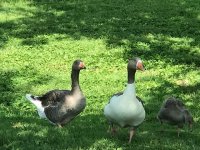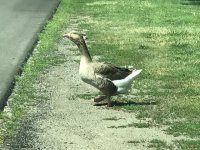Hello - very newbie here. Please forgive my stupid question.
In my hometown (Muncie, Indiana, USA) there is a flock of geese that has been around as long as I can remember. At least 15-20 years. I don't know what they are. They are not cared for, so not domestic as such. But possibly feral domestic geese or a hybrid of something or other, or possibly wild, possibly white fronted geese?
They live next to the river in a moderate size city right near two busy roads.
I'm attempting to attach some cell phone photos. If these are feral domestic geese, or a hybrid, can they "officially" be counted? I feel like not, but I'm brand new to keeping records.
Thanks for any info on either ID or the "rules."
Kim
In my hometown (Muncie, Indiana, USA) there is a flock of geese that has been around as long as I can remember. At least 15-20 years. I don't know what they are. They are not cared for, so not domestic as such. But possibly feral domestic geese or a hybrid of something or other, or possibly wild, possibly white fronted geese?
They live next to the river in a moderate size city right near two busy roads.
I'm attempting to attach some cell phone photos. If these are feral domestic geese, or a hybrid, can they "officially" be counted? I feel like not, but I'm brand new to keeping records.
Thanks for any info on either ID or the "rules."
Kim






